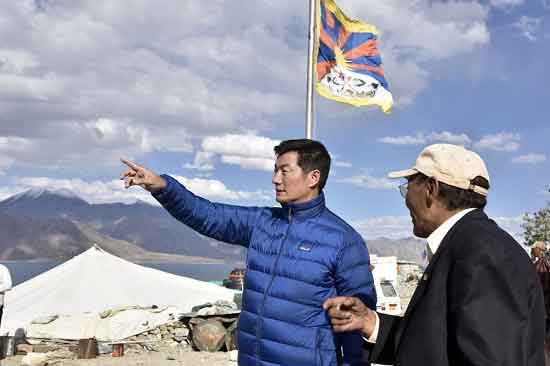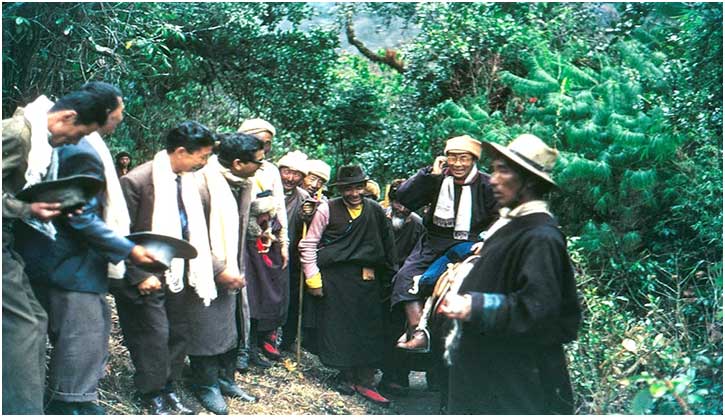
After the initial welcome address, I was curious and simultaneously wondering how to begin discussions on such a sensitive but blatantly ignored social and political issue not only for Tibet and India but also on a global sensitivity on violation of human rights. I had the privilege of interacting with Mr Tenzin Tsundue, who is a Tibetan freedom activist for the past 25 years, writer and a poet. He is a recipient of the Outlook – Picador Award in 2001. He has penned his thoughts and feelings on his journey in life through his poems and writings, which have also been translated into several other languages. Mr Tsundue was born in Spiti Valley, Himachal Pradesh in 1975. He completed his schooling in Dharamshala and later completed his Bachelor of Arts and Master of Arts from Madras and Bombay respectively. His life took a turn when he decided to return to Tibet to fight for freedom, but he was arrested, blindfolded, beaten and interrogated for three months and later was exiled from Tibet.
Before beginning discussions on Tibet and the Tibet, we acknowledged the need to thoroughly understand the issue of Tibet from its root and in order for me to understand from the beginning till the present scenario, we felt the need to discuss on, “What is Tibet issue?”, “How is it affecting India?”, “What is the condition of people in Tibet?”, “What China is doing?”, “Why are we designing such a campaign?” and “Why should India Junk One China Policy?”.
It all began when China was able to enter Tibet in lieu of liberating the people from feudal society, but they stayed in Tibet to maintain the occupation in 1949. Tibet was not aware politically of the expansionist intention of China as they primarily were nomads and farmers. The Chinese cunningly later convinced that they would make Tibetans prosperous and self-sufficient. This point of submission by the Tibetans to the Chinese led to the point of no return as China invaded Tibet completely through a constant process of sending military and suppressing Tibetans. I was completely taken back as Tibet was an independent nation when, at the same time, India was fighting for her freedom. I asked him why the Tibetans had not deployed their military to fight the Chinese, which was replied saying Tibetans follow Buddhism, and we believe in Ahimsa, peace, trust and understanding. Therefore they did not build a massive military with up to date arms.
India, as a nation is similar to Tibet in terms of its philosophy, thoughts and her belief in Non – violence, should be concerned the most on this issue. The British, during its rule, wanted to keep Tibet as a buffer between India and China to safeguard the empire from the threat posed by the Chinese. Indian now does not have the luxury of the buffer which could have been provided by Tibet and is now forced continuously to be on her toes to keep China in check; this can be verified by the Doklam faceoff and the recent Ladakh crisis. If India has Tibet as her neighbour, it would significantly reduce the military costs which can be used in other pressing social areas. Tibetans and Indians in the Himalayan region share more common culture than Indians in the plains or South. The communities earlier had shared their bond beyond trade with cultural and marital ties. He also suggested that India should junk its one-China policy not only due to his anger towards China but also due to how China frequently discredits “One India” by constantly provoking India by claiming Arunachal Pradesh as South Tibet and treating Kashmir as a part of China and Pakistan and not India. India should respond to these provocations by establishing the border as Indo – Tibet border instead of Indo – Chinese border officially and should be stressed as such at the highest tables of the UN.
The life of a Tibetan in India has things to cherish as well as things to yearn for. Majority of the Tibetans live in Dharamshala, where they are not discriminated against, and the society treats them as their own. They are allowed to travel to any part of the country and practise any legal business or work in the country. However, Tibetans are not allowed to own property and can only take them on lease. I was able to feel the pain they are going through as anyone who is in exile is always in a state of uncertainty as to how things would change for them in future in terms of the law, statehood etc. Tibetans consider India or any place they stay currently as their house but not their home because they consider home as a sacred place which can only be set up when they return to Tibet.
One of the most disheartening reality we had discussed was that the world community despite being aware of the facts on what had happened to Tibet and its people are maintaining a hush silence. All the powerful countries are playing politics and are trying to safeguard their interests as no country currently would ideally want to be in the bad books of China due to the fear of their economic and military might. A lot of developed countries have set up dirty industries in China to protect their environment and culture. These countries have also been able to leverage the lack of labour laws to exploit the maximum out of the labours, which results in cost-saving and hence maximised profit.
I was able to deduce a lot of will power and strength from the community by talking with Tenzin Tsundue, a few traits of the Tibetan community. Tibetans are strong in their heart and believe that an Ahimsa and nonviolent path to freedom and Dharma is the way to get their land and rights back from China. They firmly believe that Ahimsa should not be seen as a sign of weakness, but resilience in their heart to fight back for what is rightfully theirs and are hopeful of returning to their home someday.
V J Amarnath is pursuing 2nd year MBA at IIM Ahmedabad.
SIGN UP FOR COUNTERCURRENTS DAILY NEWSLETTER













































